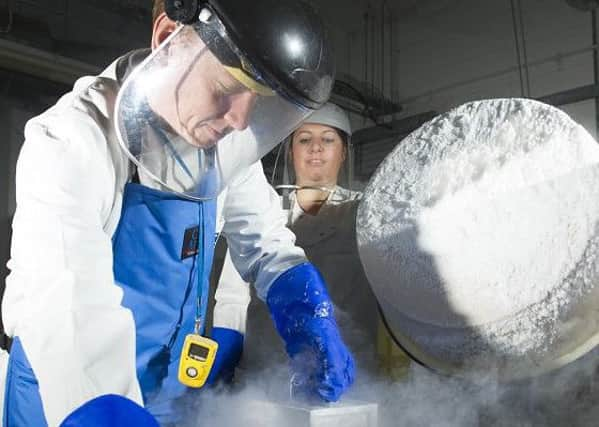Frozen tissue programme offers hope to young cancer patients


The pioneering new service for pre-pubescent boys has been launched by Edinburgh University, in the hope that the tissue could be re-implanted when they reach adulthood.
High dose chemotherapy and radiotherapy can cause infertility by reducing the sperm count and affecting its ability to fertilise the egg.
Advertisement
Hide AdAdvertisement
Hide AdRestoring fertility in men is more difficult than in women as the testicular tissue of prepubescent boys is not yet able to produce sperm.
Adult sperm cells can be frozen, but young boys currently have no way of preserving their fertility as their cells are too immature.
Lead scientist Dr Rod Mitchell said he was confident that the science will catch up over the next 20 years to allow this generation of boys to become fathers.
It comes after a female cancer patient from Edinburgh became the first woman in the UK to give birth using frozen ovarian tissue.
Dr Mitchell, clinical fellow at Edinburgh University’s MRC Centre for Reproductive Health, said: “Clinicians and scientists in Edinburgh have very recently developed a service to store testicular tissue from boys as young as one who are at risk of infertility as a result of cancer treatment.
“Although still considered experimental, the option to store tissue, combined with research aimed at developing methods to restore fertility, offers real hope of fatherhood for these patients.”
One of the first patients is a five-year-old boy, who is currently receiving high dose chemotherapy and radiotherapy in Edinburgh after being diagnosed with a brain tumour in December.
The tissue will be stored for up to 55 years.
Dr Mitchell said: “The male side is really 20 years behind the female side but we hope that we will learn a lot from what’s happened in Edinburgh over the last 20 years in the hope that we can develop similar strategies for boys.
“This is a really pioneering service for the UK.”
Advertisement
Hide AdAdvertisement
Hide AdThe UK-first Edinburgh Fertility Preservation will offer this service to male cancer patients up to the age of 16 who cannot produce semen and are at a high risk of infertility.
Dr Calum MacKellar, director of research at the Scottish Council on Human Bioethics, said: “I would very much welcome these kinds of procedures, as long as in the case of the young boys that the tissue being used has come from themselves.
“There would be ethical problems presented if the tissue was implanted into somebody else. But what has been presented by Edinburgh University looks to be a very positive development.”
Professor Allan Pacey, chairman of the British Fertility Society (BFS), said: “This exciting and ground-breaking research being carried out by colleagues at the University of Edinburgh has the potential to help many young people who face cancer treatment preserve their fertility chances in the future.
“Storing ovarian tissue and more recently storing testicular tissue is becoming more mainstream, but we need more centres providing this service.”